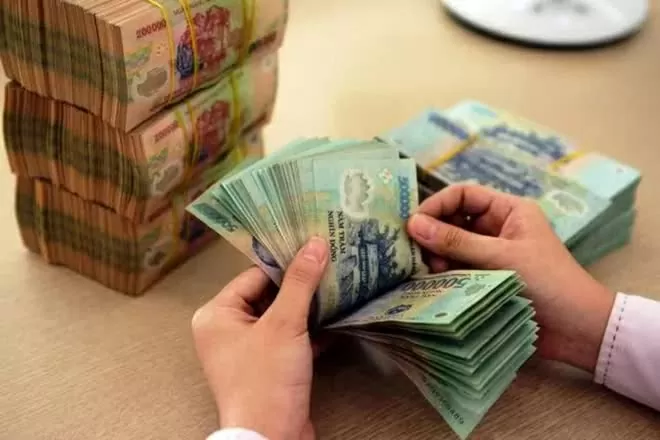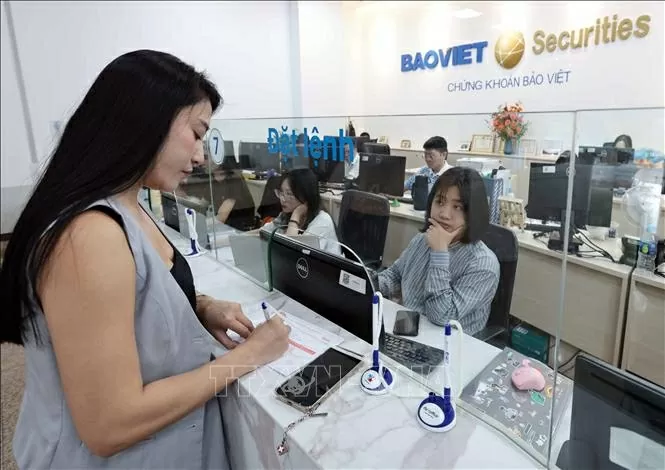
Prime Minister directs to enhance effectiveness of monetary and fiscal policy management
Latest
 |
| The Prime Minister directed to strengthen the effectiveness of monetary and fiscal policy management. (Illustration image: VGP) |
Dispatch was sent to Ministers, Heads of ministerial-level agencies, agencies under the Government; Secretaries of Provincial and Municipal Party Committees of provinces and centrally run cities; Chairmen of People's Committees of provinces and centrally run cities; Chairmen and General Directors of State-owned Corporations and General Companies.
According to the Dispatch, in the first 6 months of 2025, the world situation continues to have many new, rapid, complicated and unpredictable developments, affecting global investment and trade, and the prospect of world economic growth is declining.
Domestically, under the leadership of the Party, headed by General Secretary To Lam, the support of the National Assembly, the drastic, timely and effective direction of the Government, the Prime Minister, all levels, sectors and localities, and the unanimous support of the entire political system, people and businesses, our country's economy in the first 6 months of 2025 has achieved positive results in most areas.
However, in the context of more difficulties and challenges than opportunities and advantages, in order to successfully achieve the economic growth target of 8% or more in 2025 and double digits in the following years, the Prime Minister requested Ministers, Heads of ministerial-level agencies, Government agencies, Chairmen of People's Committees of provinces and centrally-run cities, Chairmen and General Directors of State-owned Corporations and Corporations and requested Secretaries of Provincial and Municipal Party Committees to continue to lead, direct, organize the drastic, synchronous and effective implementation of tasks and solutions set out in the Resolutions and Conclusions of the Party, Resolutions of the National Assembly, the Government, and directive documents of the Prime Minister; in which focus on implementing key tasks and solutions.
Implement proactive, flexible, timely and effective monetary policy management
Regarding monetary policy, the Prime Minister requests the State Bank of Vietnam to take the lead, in coordination with relevant agencies, to closely monitor developments in both the global and domestic economies in order to actively, flexibly, promptly, and effectively manage monetary policy. This management must align with macroeconomic trends and monetary policy objectives, in accordance with the key tasks and solutions outlined in Government Resolution No. 154/NQ‑CP dated May 31, 2025, the resolutions of regular Government meetings, and direct orders from the Prime Minister. It must also coordinate tightly with fiscal policy and other macroeconomic policies to stimulate growth, control inflation, stabilize the macroeconomy, and ensure the economy’s major balances.
The State Bank of Vietnam is to direct credit institutions to continue reducing costs, simplify administrative procedures, and strengthen digital transformation to lower lending interest rates. These measures are aimed at supporting production and business activities of enterprises and individuals under the guiding principle of “balanced benefits, shared risks.” Credit should be steered toward priority sectors and traditional economic growth drivers (investment, exports, consumption), as well as new growth drivers (science and technology, innovation, digital economy, green economy, circular economy, etc.). Measures to resolve non-performing loans should be intensified and prevent the emergence of new bad debts, with a goal of approximately 16% annual credit growth compared to 2024.
From 2026 onward, credit growth will be managed via market-based tools instead of quotas.
The State Bank of Vietnam should manage the exchange rate flexibly, harmoniously, and in reasonable balance with interest rates. It must closely monitor domestic and international economic and financial market developments—especially policy adjustments by the U.S. Federal Reserve (Fed) and other central banks—to improve the quality of analysis and forecasting and respond with timely, effective policies. It should diversify foreign currency supply channels, stabilize the Vietnamese dong, and improve the balance of payments.
The State Bank of Vietnam, in conjunction with relevant agencies, is to promptly review, analyze, and evaluate the impact of international experience, and urgently consider removing administrative instruments in directing credit growth—specifically, refraining from allocating growth targets to each credit institution. Instead, credit growth should be steered through market mechanisms and each institution’s risk assessment. A set of credit safety control criteria will be developed to ensure credit is allocated proactively, promptly, and effectively, contributing to sustainable economic growth tied to macroeconomic stability, the safety of the banking system, and financial security. This task is to be completed by July 2025.
The State Bank of Vietnam and relevant agencies should promote credit programs for youth under 35 to purchase, rent, or rent-to-own social housing; a VND 500 trillion credit program for enterprises investing in infrastructure, science and technology, innovation, and digital transformation; credit support for interlinked production, processing, and consumption of high-quality, low-emission rice in the Mekong Delta…
Enhance measures for timely, effective management of the gold market; urgently submit to the Government a revised decree amending Decree No. 24/2012/NĐ‑CP on managing gold trading activities before July 15, 2025.
 |
| Customers trade at Bao Viet Securities Company. |
Continue to operate a reasonable, focused and key expansionary fiscal policy
On fiscal policy, the Prime Minister assigns the Ministry of Finance to lead, in coordination with relevant agencies, the continued reasonable and focused expansion of fiscal policy, closely coordinating with monetary and other macroeconomic policies.
Strengthen state budget revenue management; continue broadening revenue streams—especially from e‑commerce and food‑service sectors; modernize tax administration, and vigorously implement the requirement for electronic invoices generated from cash registers; aim for a 20% increase in state budget revenue in 2025 compared to the estimate.
Thoroughly save on recurrent expenditures, including an additional 10% cut in the recurrent budget for the last seven months of 2025, as directed by the Government and Prime Minister, to support social welfare and the construction of boarding schools for students in remote, border, special administrative, and island areas.
The Ministry of Finance must allocate sufficient and timely funds to pay for policies under Decrees No. 178/2024/NĐ‑CP and No. 67/2025/NĐ‑CP, as well as tasks related to administrative unit reorganization and implementing two-tier local government. It must promptly issue guidance to address financial–budgetary challenges faced by localities (especially communes) when operating the two-tier local government model, ensuring smooth, effective, and continuous implementation.
Effectively implement policies for tax, fee, charge, and land rental exemptions, reductions, or deferments, along with other mechanisms and policies to facilitate residents and businesses, promote production and business, and create jobs and livelihoods.
The Ministry of Finance will design effective, selective mechanisms to attract foreign direct investment (FDI), focusing on promoting large-scale, high-tech, environmentally clean projects. It must promptly identify and resolve difficulties faced by FDI enterprises, especially by reducing administrative procedures to accelerate project implementation in Vietnam.
The Ministry of Finance, in coordination with relevant agencies, will effectively advise the Government’s Task Forces to strengthen inspection of public investment disbursement in ministries, agencies, and localities. It will continue reviewing and compiling adjustment requests for the 2025 public investment plan, reporting to the relevant authorities as prescribed to accelerate disbursement in 2025.
The Ministry of Finance will implement measures, as required, to upgrade the stock market from frontier to emerging status, working closely with other ministries and agencies to promptly overcome obstacles to meet the upgrade criteria.
The Ministry of Finance will urgently submit to the Government draft decrees detailing the laws and resolutions passed by the 15th National Assembly at its 9th session in the financial domain, ensuring simultaneous effectiveness with the laws; and will submit a draft resolution on piloting the regulated asset-backed market by July 15, 2025.
The Ministry of Finance, with relevant agencies, will review and assess the impact of the U.S. “reciprocal tax” policy on Vietnam, develop support policies for affected businesses and workers, and report to the competent authority before July 15, 2025.
The Prime Minister requires ministries, agencies, and localities to proactively monitor international and domestic developments, respond with appropriate, timely, and effective policies, and swiftly develop contingency plans to avoid being passive or caught off guard.
Implement more drastically, strongly and effectively the tasks and solutions to promote the disbursement of public investment capital, striving to disburse public investment capital in 2025 to reach 100% of the plan assigned by the Prime Minister; use public investment to lead private investment, and strengthen public-private cooperation.
Clearly identify the bottlenecks and causes of delayed disbursement for each specific project in order to provide timely direction and resolution; resolutely focus on land clearance work, address difficulties in the supply of construction materials, and accelerate the progress of key national and critical projects; promptly reallocate capital from slow-disbursing projects to well-performing ones in accordance with regulations; ensure that rapid disbursement goes hand in hand with maintaining project quality, and prevent misconduct, corruption, and waste; promptly handle officials who are incompetent, evade responsibility, or fail to fulfill their assigned disbursement duties.
The Prime Minister requests that ministries, agencies, and localities strive to increase total social investment capital by 11–12% compared to 2024; urgently resolve long-standing issues and lingering obstacles in delayed projects within their authority to free up resources for development and prevent waste.
The Prime Minister also instructs ministries, agencies, and localities to focus on formulating the 2026–2030 medium-term public investment plan, ensuring that capital is allocated in a focused and strategic manner, avoiding fragmentation; the total number of centrally funded projects for the 2026–2030 period must not exceed 3,000; and proactively prepare for the investment of nationally significant and key projects planned for implementation during 2026–2030.
Set out decisive, breakthrough, practical, and effective tasks and solutions for the second half of the year
Regarding the mid-year review and implementation of tasks for the second half of 2025, the Prime Minister requires ministries, agencies, localities, state corporations, and general companies to promptly conduct a review of the first six months of 2025 and define the key tasks and solutions for the remainder of the year, aiming to successfully achieve the 2025 targets. These efforts will contribute to achieving the national economic growth goal of at least 8% in 2025. The review must carefully assess the context and situation, clarify the achieved results, as well as identify limitations and obstacles encountered in the first half of the year; thoroughly analyze both objective and subjective causes; and draw lessons learned. Based on this, propose decisive, breakthrough, feasible, and effective solutions and tasks for the second half of the year.
Based on their assigned objectives, functions, duties, and authority, ministries, sectors, agencies, units, and localities must demonstrate strong determination, great effort, and resolute action. At the same time, specific assignments must be made to relevant agencies and units according to the principle of "six clarities": clarity of person, task, timeline, authority, responsibility, and outcomes.
The Prime Minister emphasizes the need to uphold a spirit of responsibility, self-reliance, and resilience; proactively handle tasks and resolve difficulties and bottlenecks within the scope of assigned functions, duties, and authority; and for matters beyond their authority, promptly report and propose solutions to the competent authorities in accordance with regulations.
The deadline for completing the mid-year review and proposing tasks and solutions for the second half of the year is no later than July 15, 2025.

























